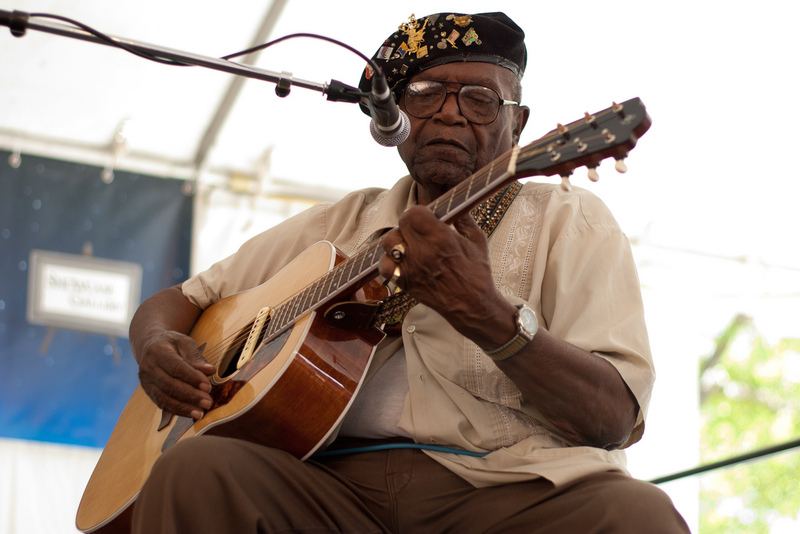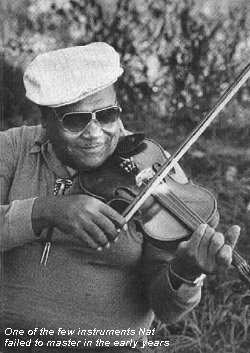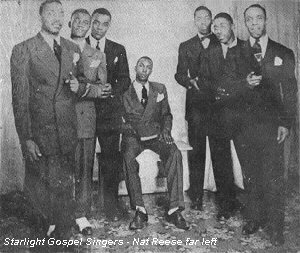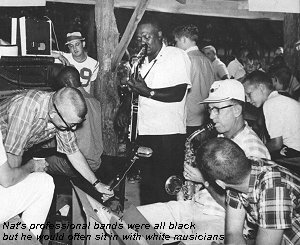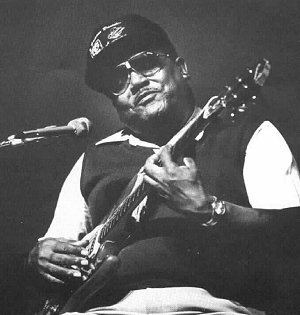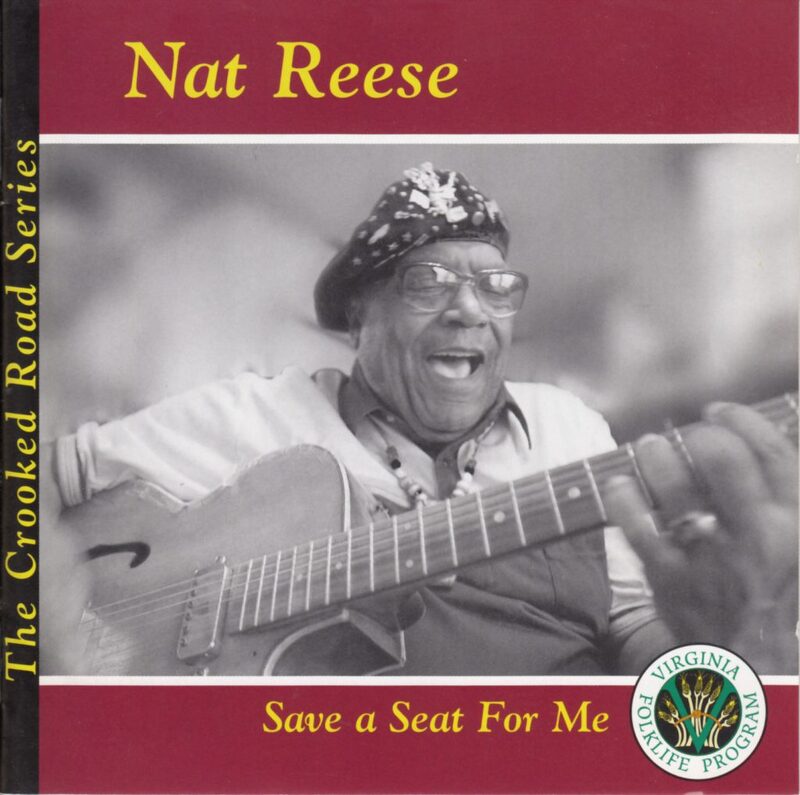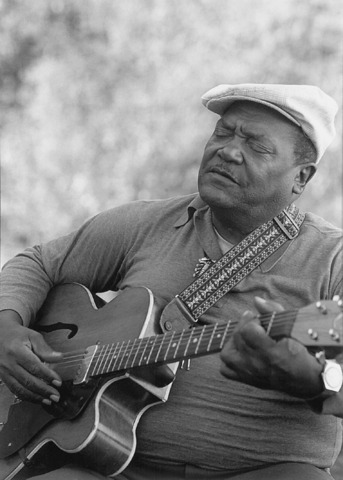Nat Reese
Nathaniel Hawthorne Reese, Sr., was born on March 4, 1924 in Salem, Virginia to Thomas Walker Reese and Rosa S. Reese. The Virginia Folklife Program provided the following portrait of his family’s origins:
Thomas was originally from Montgomery, Alabama, and Rosa from Bessemer, Alabama. The family had previously lived in Florida and Georgia before coming to Virginia to, as Nat puts it, “get away from the cotton fields.” In Salem, the Reeses lived on Water Street while his father drove a truck for a coal and ice company by day, and operated a small store, covering the evening shift every night until 8pm. Rosa kept a cow and sold milk and butter at the family’s store. Both parents were musical, Nat’s father played guitar and his mother the concertina. Nat recalls learning “Life Is Like a Mountain Railroad” at his mother’s knee.
When Nat was around age four, the family moved to Wyoming County, West Virginia, where his father found work with the shop at the Virginia Railroad, earning $2.64 per day.
It was here in Princeton, West Virginia, where Nat lived most of his life, that he was influenced by “the itinerant blues musicians who came through the coal camps as part of the chitlin’ circuit from the Mississippi Delta, as well as the countless other musical styles of the diverse communities of the coal camp” (Lohman). He was exposed to big band, jazz, blues, polkas, country music, and other styles popular at the time. He learned to play music from his parents, and eventually was proficient in guitar, piano, organ, bass, and string harp. By the age of nine, Nat’s talents were beginning to be noticed by the community. A train engineer asked Nat’s father if he could perform at a local school for the pay of $6, and this performance opened the door to performances in coal camps around the region as warm-up entertainment when coal executives were there to speak.
About the same time, Nat took to sitting on the railroad track in front of a house where a gospel quartet comprised of miners and railroad workers gathered to practice. When one of the vocalists was killed in the mine, young Nat was asked to join since he possessed a fine high-tenor voice, and already knew all their songs from listening in. The three adult members assured Nat’s parents they would be responsible for their “little brother” when the group traveled the region. About the time Nat’s voice began to change, Edward Buford, the leader of the Kings of Harmony Gospel Quartet, moved from Alabama to Slab Fork, east of Beckley, and gave Nat his first formal singing instruction, greatly improving Nat’s skill as a gospel quartet singer. (Virginia Folklife Program)
Nat performed in string bands playing the coal fields before racial integration was enacted. He participated in several gospel groups: Harmonizing Four Gospel Quartet, in Itmann, WV; Starlight Gospel Singers, in Itmann, WV; and Heavenly Gospel Singers, Mt. Clemons, MI. These groups toured churches, played on radio programs, and even placed well in competitions. Nat noted that when his earlier group was touring the south they avoided South Carolina because of the high levels of racism in the state. It was on one of these tours that Nat met Bessie Smith, a minister’s daughter, who became his wife.
Nat was only permitted an eighth-grade education, and while he spent some time working in the mines, he quickly realized it was not for him. His talents, however, extended beyond music and after taking second place in an art contest Nat was admitted to Bluefield State College, earning a degree in commercial art. The WV Encyclopedia provides Nat’s additional work history as:
For two years, he played jazz and blues on Bill Farmer’s Saturday night show on radio station WHIS Bluefield. He attended Bluefield State College for two years, then left to serve in the U.S. Army during World War II. During and after his college years, he was part of a dance band that played jazz, polkas, and blues throughout the southern coalfields. In the early 1950s, Reese moved to Michigan and worked in construction, returning to West Virginia in 1959 to work for the State Road Commission. In 1962, he was hired as a photographic silkscreen printer at Rockwell International’s aviation plant in Princeton, where he stayed for 13 years. Reese, who lived in Princeton, played and taught at the annual Augusta Heritage Arts Workshops at Davis & Elkins College, and performed regularly.
Despite his varied work history, Nat is best known as being one of West Virginia’s few traditional blues artists and as a nationally recognized blues singer and guitarist.
Nat’s later music was concentrated in the areas of blues and swing, and he often played with renowned fiddler Howard Armstrong. They traveled widely playing together, included several tours across Europe. Nat was a fixture at festivals such as the Blue Ridge Music Festival in Ferrum, VA and programs at the Augusta Heritage Center, and he performed at both the Smithsonian and National Folk Festivals. He was honored with the John Henry Award in 1988, the Vandalia Award in 1995, and was inducted into the West Virginia Music Hall of Fame in 2009. Nat produced a solo album, Save A Seat For Me, recorded in Galax, Virginia, and the track listing along with detailed song stories can be found here.
Nat was fondly remembered by his family and all who knew him and was noted for his varied and unique experiences and interests. Jon Lohman provides this look into Nat’s life:
To talk to Nat was to get a glimpse into a life that was both completely unique and quintessentially part of the American experience. Many of the events of Nat’s life are the stuff of blues legend. As a young man he was run over by a coal truck, leading the doctors to conclude that he would never play or walk again. He sat in on an illegal card game (immortalized in a number of songs) where a particularly obnoxious participant was actually shot at the table, then pulled over to the corner so that the game could continue. Nat himself was shot on stage in a roadhouse called “Big Mama’s” outside of Bluefield, with the bullet piercing his cherished Gibson guitar into his side. And yes, he was most disappointed about the Gibson.
Like most African Americans of his generation, Nat endured a tremendous amount of discrimination and bigotry in his life. Still, he always remained resourceful, independent, and in control, caring for his family, mastering numerous trades, including commercial art, construction, television and stereo repair, selling newspapers, mechanics, coal mining, and, of course, music. Nat never played the victim.
Nat passed away at his residence, 115 Bell St. in Princeton, at the age of 88 on Friday, June 8, 2012. His obituary stated:
Nat will be remembered for his lifetime of wonderful music, his passion for life, his dear kindness, and the lessons of wisdom he so generously gave to us. While Nat will always be remembered as a singer of the blues, he always thought of himself as a gospel singer at heart. One of his favorite lines to sing was "If you make it into Glory before I do, Save a seat for me". Nat played music his whole life, and many felt that he only got better as he aged.
WATCH
LISTEN
-
Written by Melissa Nichols
Sources:
- e-WV: The West Virginia Encyclopedia "Nat Reese." e-WV: The West Virginia Encyclopedia. 14 August 2023. Web. https://www.wvencyclopedia.org/articles/47
- Kline, Michael. “Nat Reese: Life and Music in West Virginia.” Music Traditions. 1987. https://www.mustrad.org.uk/articles/reese.htm
- Nat Reese obituary https://www.seaverfuneralservice.com/obituary/6258320
- “Nat Reese: Save A Seat for Me.” Virginia Folklife Program. 2014 September 4. https://www.virginiafolklife.org/sights-sounds/nat-reese/
- “Nat Reece”, WV Music Hall of Fame Inductees of 2009 https://www.wvmusichalloffame.com/hof_reese.html
- “Remembering Nat Reese: A Man and A Half”, Virginia Folklife Program. 2012 June 9. https://www.virginiafolklife.org/sights-sounds/remembering-nat-reese/
